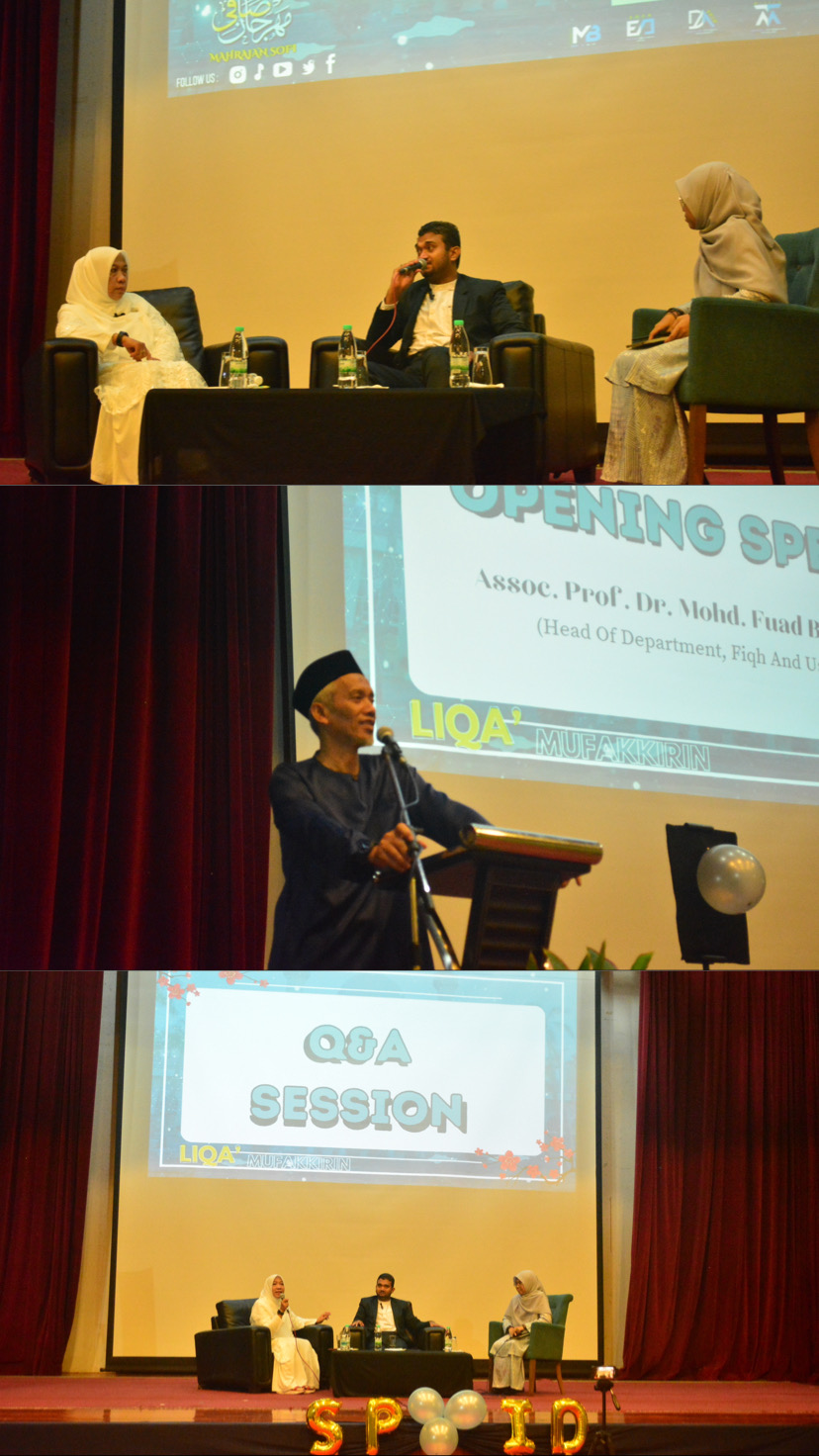By, Nik Huda Sofea Nik Kamaruddin, Nurul Hana Mohamad and Al-Ahwaziy Ab Latif
The Fiqh and Usul Al-Fiqh Festival 2024 (Mahrajan Sofi) launched with a captivating intellectual forum, “Liqa’ Mufakkirin: Unveiling the Fiqh Behind Halal Pharma Innovations,” held during its grand opening ceremony on Monday, 14 October 2024, at the Main Auditorium, IIUM Gombak. The event was officially inaugurated by the Head of the Department of Fiqh and Usul al-Fiqh, Assoc. Prof. Dr.Mohd. Fuad bin Md. Sawari.
The forum brought together two experts in Islamic medical jurisprudence and the halal pharmaceutical sector. Leading the discussion as panelists were Dr. Sayyed Mohamed Muhsin from the Department of Fiqh and Usul al-Fiqh and Assoc. Prof. Dr. Betania Kartika Muflih from the International Institute for Halal Research and Training (INHART), delivering their expert analyses on the role of Islamic jurisprudence in modern halal pharmaceutical innovations.
The event “Liqa’ Mufakkirin: Unveiling the Fiqh Behind Halal Pharma Innovations” delved into the intersection of Islamic jurisprudence and modern pharmaceutical practices. The panelists discussed how medicines are certified as halal, emphasizing the growing demand for halal-certified products. The event highlighted the challenges faced in ensuring that pharmaceutical products adhere to Shariah law, with scholars explaining how fiqh plays a crucial role in determining the permissibility of ingredients and processes. Key concepts such as the five fundamentals of maqasid al-shariah and Qawaid Fiqhiyyah were explored, illustrating the importance of preserving religion, life, intellect, lineage, and wealth in the context of health and medicine.
A central point was made about the importance of ensuring that pharmaceuticals are not only halal in their ingredients but also in their production, storage, and handling. The Malaysian Standard MS2024 was cited as a critical reference point, ensuring that halal pharmaceuticals are free from contamination by impure substances (najs) and are safe for consumption. Participants also referenced Qur’anic verses such as Surah Al-Baqarah: verse 168, Surah al-A’raf: 157, Suran al-Maidah: 3 & 90 which speaks to the importance of consuming what is both halal and wholesome and staying away from the prohibited materials.
Ethical challenges in the halal pharmaceutical industry were also discussed, particularly concerning the transparency of ingredients and the necessity of ensuring products are halal and tayyiban (clean and pure). Issues such as the use of gelatin derived from pigs and alcohol in medical products were debated, with scholars emphasizing the need for alternatives when faced with non-halal ingredients. The principle of necessity (darurat) was highlighted, allowing for the use of prohibited substances only in life-threatening situations, but the event also stressed the importance of research to find halal substitutes.
The session concluded by addressing the challenges facing the pharmaceutical industry in producing halal-certified products. Scholars emphasized the need for continuous research to find replacements for non-halal ingredients and stressed the importance of students in the religious field contributing to the development of halal pharmaceuticals.
Both speakers highlighted the significance of incorporating the values of ihsan (excellence), taqwa (piety), and ikhlas (sincerity), as well as pioneering efforts in research and innovation within the pharmaceutical industry. These principles ensure that advancements are not only ethically sound and beneficial but also rewardable, promising, and focused on serving the well-being of all humanity.***
- Edote and IIUM Celebrate World Braille Day 2026 with Braille Reading and Azan Competitions for the Visually Impaired - February 4, 2026
- Beyond Metaphysics: Rethinking Islamic Eschatology in the 21st Century - February 4, 2026
- The Golden Age of Islam in the Malay Archipelago: Roots to Remember and Reflections for the Modern Generation - February 3, 2026
